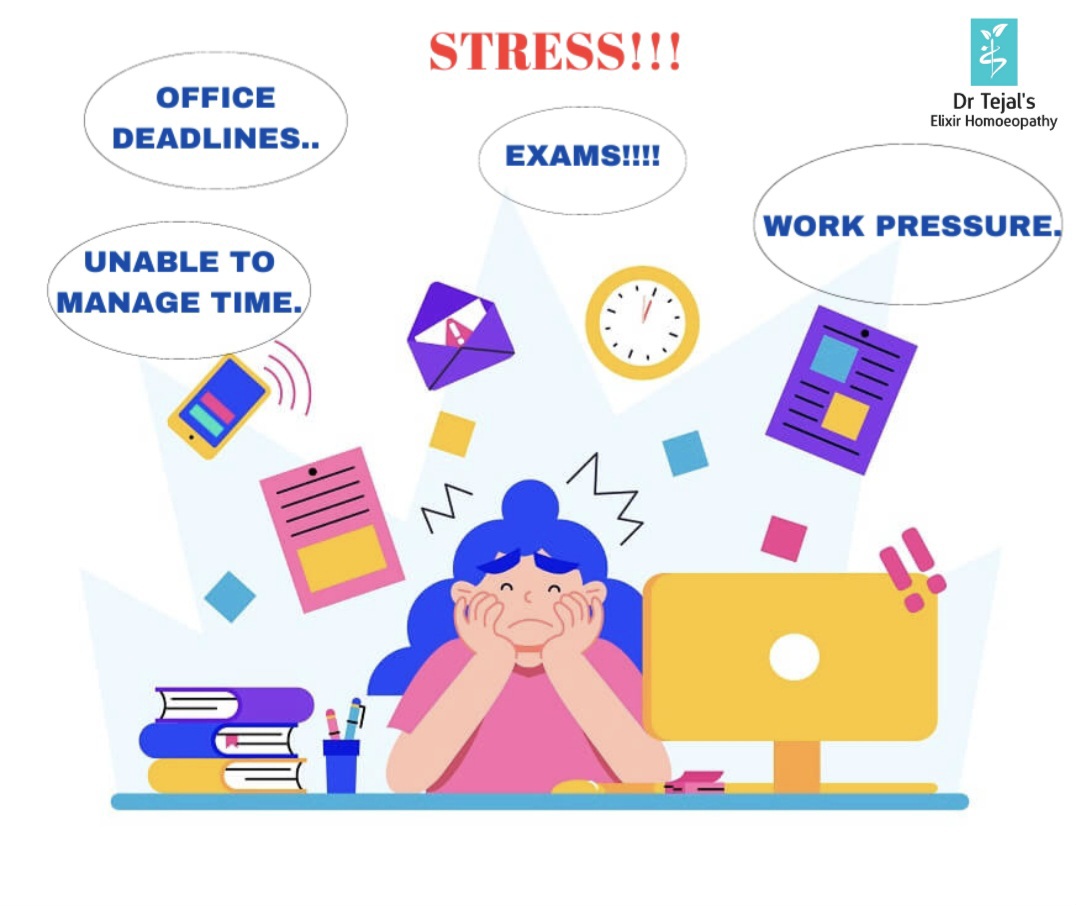
Post by Dr.Tejal Daftary and Dr. Sheetal Kantharia, Dec 02, 2023.
Stress and Health
What is stress? How to manage stress which now is a daily part of our lives? What can we do to let it not impact our physical / mental health? When to seek medical/ professional help ? Let's address some of this issues in this blog.
Stress and its Impact on our Health
Do you need one more reason to be stressed? You may be getting sick from your stress.
Over the course of their lives, a lot of people have dealt with stress, which is a severe physical and psychological response to a particular event. On the other hand, stress is a lasting feeling of being under pressure and overwhelmed. This stress over a period of time can lead to many health-related problems.
What can cause stress?
Stress can be brought on by a variety of factors, such as meeting financial needs, an unhappy marriage or family, or an unfulfilling job. There are numerous potential sources in the fast-paced society of today, e.g. For a student, exams can be stressful,
For an office worker, work deadlines can be stressful, etc. This prolonged stress gradually depletes an individual's mental reserves and harms their bodies and minds. Persistently stressed individuals may believe they have no control over their circumstances.
Continuous stress over a period of time can cause some major health-related problems. Some of which are related below:
- Obesity: Unfortunately, people who experience high levels of stress tend to store fat in their belly, even though belly fat appears to carry more health risks than fat on the legs or hips.
- Diabetes: Diabetes can deteriorate due to stress in two ways. First of all, it makes bad habits like binge drinking and unhealthy eating more likely. Second, individuals with type 2 diabetes appear to directly have higher blood glucose levels when under stress.
- Headaches: Stress can trigger headaches, not just tension headache, but migraines as well.
- Heart-related disorders: Long-standing stress or people who get stressed easily have a higher risk of having heart-related disorders, e.g. High blood pressure. Stress increases blood flow, heart rate, and also increases the release of cholesterol in the bloodstream. Many studies have shown that stress can trigger serious heart problems, even heart attack.
- Accelerated aging: There's actually evidence that stress can affect how you age. Stress seemed to accelerate aging about 9 to 17 additional years.
- Asthma: Numerous studies have demonstrated that stress worsens asthma. According to some research, a parent's ongoing stress could increase their child's chance of having asthma.
- Hormonal imbalances: Persistent high stress levels can cause hormonal imbalances in both females and males. Females it may cause Pcos, Menstrual irregularities, infertility. In males it can lead to decrease in libido, erectile dysfunctions.
- Anxiety and depression: The link between prolonged stress and increased rates of anxiety and depression should come as no surprise. According to a survey of recent research, people who experienced job-related stress, such as hard work with inadequate pay, were 80% more likely than those who did not to experience depression within a few years.
- Auto immune disorders: Many autoimmune disorders like psoriasis, alopecia, ITP are triggered due to stress.
But here's some good news before you get too worked up over being worked up. You may reduce your risk of illness and reduce your stress by implementing a few easy stress-reduction techniques.
Stress management
Though the number of stress-related health issues may seem alarming, there is hope. Research indicates that learning stress-reduction strategies may not only improve your emotional state but also have tangible health advantages.
Methods for relaxation:
- Laugh more: Laughing reduces the stress hormone cortisol. And it boosts your mood.
- Calm your mind: Meditation, massage and deep breathing exercises, listening to your favourite music or to soothing sounds, engaging in your favourite hobby.
Physical techniques
- Be physically active
- Eat a healthy diet
- Improve your sleep habits
- Stop using substances
Cognitive techniques
- Keep a journal: You can list three things you're thankful for or the good things that happened during the day.
- Establish "time for yourself”: attempting to dedicate at least one hour each day to yourself.
- Express your emotions: Reach out to a dependable friend or family member when you're feeling stressed.
- Seek help: A health professional can help you learn techniques to manage stress better.
Homeopathy for stress:
There is a lot of potential for the homeopathic remedy system to aid with stress management. Homeopathic remedies are constitutional remedies and have the best effects on stress management because they operate at a deep psychological level. They support the development of resilience to handle life's daily stresses. They also assist in overcoming stress-producing chronic grief.
While taking the entire case we access the emotional status of the patient, their trigger factors and provide correct counselling and guidance to manage there stress on individual basis
In addition to reducing the physical effects of stress, homeopathy for stress helps the body cope with stressful situations on a psychological level.
Thus indenting to give long lasting cure.
